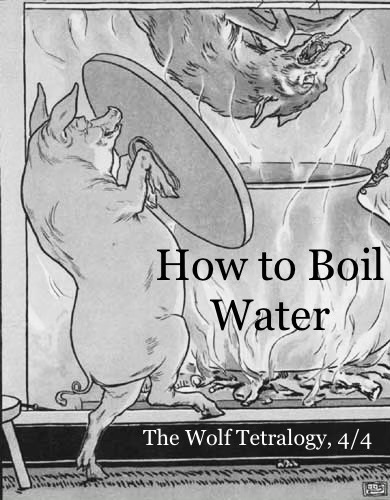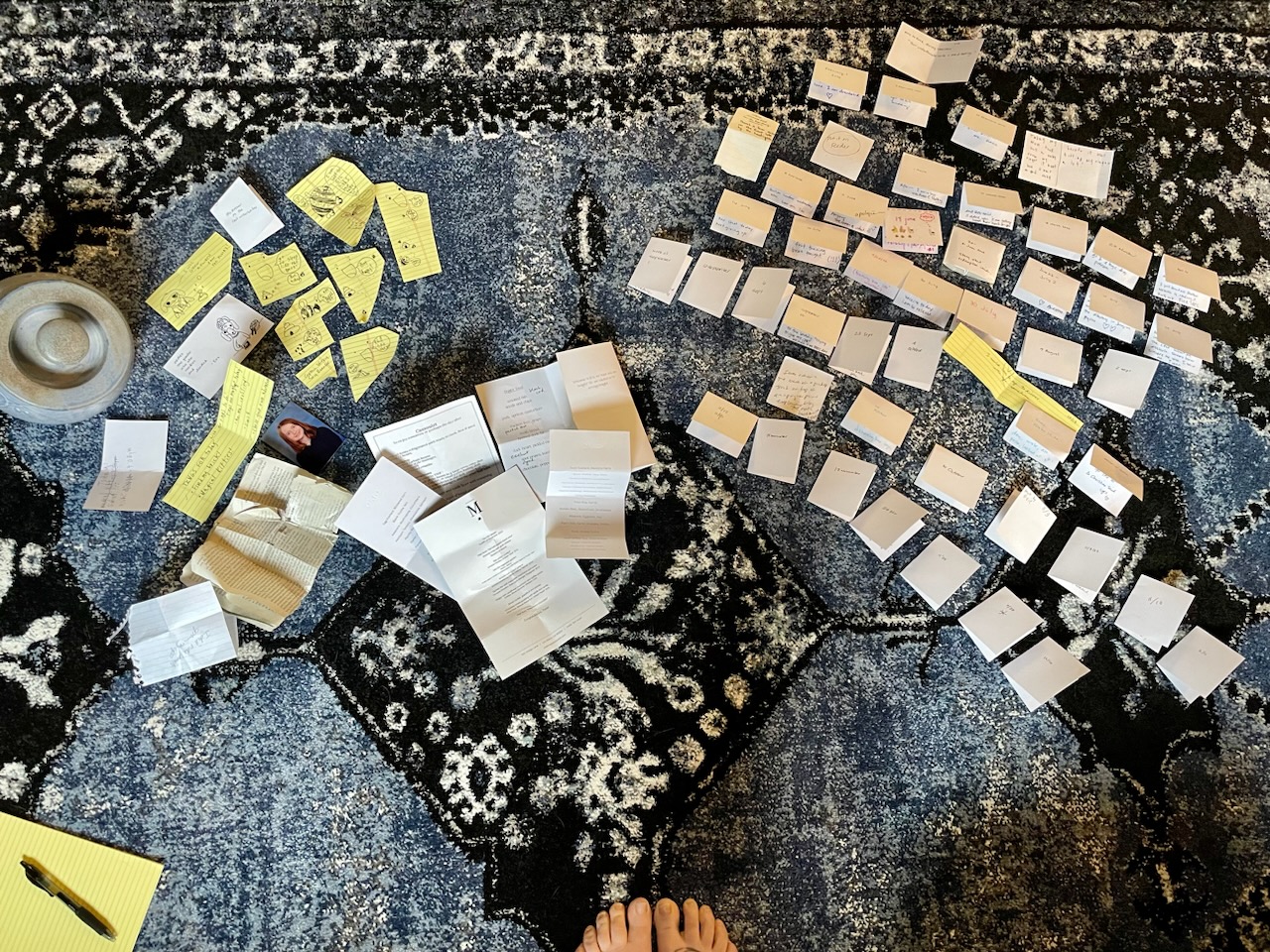“The natural progression from boiling water to boiling water with something in it can hardly be avoided, and in most cases is heartily to be wished for.” —M.F.K. Fisher
The next morning, I checked the local news online, sitting at my desk with a cup of coffee. I searched for the Baker’s name, along with the word “obituary.” There was nothing. Come on, you fucker, I thought, why aren’t you dead.
Days passed. I liked the quiet afternoons, the bare branches outside the kitchen windows, the return to normalcy. I hung out with my daughter, I wrote, I cooked our dinners.
Late one evening at the end of the week, my phone lit up and vibrated soundlessly next to me on the sofa. My daughter and I were watching a movie; she had her head in my lap so I could scratch her scalp the way she liked, and her sock-feet dangled over the other arm of the couch. I looked down to see who was calling. The Baker. I found this disappointing and unsurprising. I let it go to voicemail, and then listened to the message after my daughter had gone to bed.
He hissed furiously into the phone, “What the fuck did you tell him? I was walking down Division just now and I walked past your boyfriend and he gave me the most judgmental fucking look, like he was disgusted. I told you not to fucking tell him anything!”
I deleted the voicemail.
I blocked the Baker’s number. I blocked him on social media. It seemed baffling that I had ever thought we would be friends.
An hour later, I received an Instagram direct message from an account I did not recognize.
“Your daughter should be ashamed of you… as my daughter is ashamed of her dad. What a fucking joke you both are. Ho bag jokes.”
At first glance, I thought the message was spam, or a mistake. My daughter? But then I realized I knew the first name: it was the Baker’s wife. I seethed with rage. These people needed to leave me the fuck alone. I examined her profile picture: her windswept hair, her distant eyes; and then I blocked her, too.
When I asked my boyfriend what had happened that night, he said, “It was dark. My vision isn’t great. And the Baker was wearing a mask. I didn’t even recognize him until after he’d passed me.”
Later that winter, I ended my relationship. A couple months into the new year, I ran into my ex-boyfriend at a coffee shop. We sat at a long table in a sharp band of sunshine, trading restaurant recommendations and other bits of news.
“I found better pie,” I said. No one I was friends with was still buying from the Baker.
“I’ve only been back to the Baker’s once,” he mumbled.
I gawked.
“What. You went back?”
My ex-boyfriend shrugged. He lowered his voice. “You know, when I was there, he told me that you were the one who came on to him.”
“And you believed him?”
“Well, I entertained it,” he said, “I listened.”
I exhaled a short burst of air. It was all a lot to process. It seemed incomprehensible that he had gone back.
“Obviously he wasn’t telling the truth,” said my ex-boyfriend, his tone conciliatory. “He wasn’t credible. I believe you.”
I straightened in my seat and shook my head in wonder. “How could I be so blind,” I said, “That is what he told his wife. That’s why she sent me that message. Of course. He must have told her that I came on to him.”
I sat there blinking, my hands held up in mid-air, my body paused by thought.
I still could not imagine how the Baker had interjected this lie into that day’s conversation, between his wife telling him she wanted a divorce and the invitation to the beach house. I thought about what the Baker said about that chick the morning I had been in his restaurant. How he’d told me his wife had asked him if he was fucking her. I remembered the way he’d called the chick disgusting and said he’d had to block her.
“You ever hear from that chick?” I asked my ex-boyfriend.
“No, but I don’t think she’s doing okay. She’s been in the hospital for three days. Whatever they call it when you quit drinking cold turkey and your body shuts down.”
What if the Baker’s wife had asked the Baker the same thing, only about me: Are you fucking her? What if he had not said no. What if he let her believe it, or let her believe that was what I wanted. Torturing her. Revenge. Bluffing about me to call his wife’s bluff on that terrible threat: taking half. What a cruel and cowardly thing to do to another person, especially to one’s wife.
A couple months later, at the end of spring, my ex-boyfriend sent me a screen-capture from the Baker’s wife’s social media. She had posted my profile photo on her own social media page with the caption, “How this ho-bag keeps coming into my suggested FB world says alot [sic] about my ‘men friends’…. You all need help. Ho bags be just that. Check yourself & check your HiV status.”
Reading it made me feel sick; it was appalling. It had been five months since I had blocked both of them: the Baker and his wife. The Baker’s wife had used a fake name on the account she used to defame me; I blocked that one, too.
The last text I ever received from the Baker was the suicide note. I never replied. I resented it, at the time, for even the half-second of attention reading it had taken away from my daughter. I resented having been polite to him. I resented having been taught by this culture that politeness protects us, when it simply makes a person less of an obstacle, and easier to overpower. Fuck being polite.
A close friend said it best: The problem is that a lot of humanity has learned manners instead of respect.
I imagined Anthony Bourdain sitting next to the Baker at the bar, still holding the top from the full bottle of tequila between his fingers, but on second thought, palming it, and then clearing his throat, handing the cork to the Baker, and pushing back his seat to leave. But none of that mattered: throwing away the top never meant anything, not really, not the way the Baker imagined it. The only thing that act truly signified was a mutual dedication to self-destruction. The story was a cheap trick, cultural currency for impressing girls; the forced insinuation that because Bourdain had invested time in the Baker, the Baker was worth something.
He was not. No. He was worthless.
A Further Note on My Nickname
When I was fifteen, I worked for part of that summer in exchange for room and board at a vegan hot springs hidden in the mountains above the rice paddies and almond orchards in Northern California. I had no car; the nearest town was thirty miles away. There was no electricity, and the phone line was sometimes down for days at a time. It was there I taught myself to cook, with things I found in the cool, dim pantry behind the communal kitchen. The staff was vegan, and so even though I was not, I cooked and ate a diet of vegan things. At first, I ate anything I could find; but the best things were the cold cans of creamed corn I sawed open with a knife when I could not find a can-opener. I sat on the propane chest freezer and ate the sweet silky kernels with a long-handled iced-tea spoon. Next, I ate the two-pound bag of raisins they kept for baking, a handful at a time, until after a few days it was gone.
Later that month, a young Greek couple, guests at the hot springs, offered me a ride to town to grocery shop with them one evening. The small, dusty store buzzed with flies. I filled my basket with cans of tuna (and a can-opener); and then butter, bacon, sealed packages of sliced ham, and whole frozen chickens. I worried about where I could hide the meat before I ate it when I got back. I wandered, distracted.
The butcher, in his blood-stained smock, leaned on the counter at the end of the aisle under bluish fluorescent lights. He growled at me with a filthy, menacing sneer on his face, “Little girl… Do you want to know how to make headcheese?”
I nearly ran at him; I was starving. “Yes!” I yelled.
He jumped back, eyeing me, suddenly uncertain.
This little piggy, who had come to market.
Porkchop.
There’s that other nursery-school story about pigs: “The Three Little Pigs.” In that fable, the wolf is so infuriated with not being able to get to the third little pig (who had probably blocked his calls) that he rages and swears that he’s going to come down the chimney. While he’s climbing up to the roof, the piggy stokes the fire to blazing and puts on a big pot of water to boil.
“Then, just as the wolf was coming down the chimney, the little piggy pulled off the lid, and plop! in fell the wolf into the scalding water. So the little piggy put on the cover again, boiled the wolf up, and the three little pigs ate him for supper.”
Personally, my favorite way to turn an old wolf into soup is to simply tell the story. No need for a recipe: he will find himself immediately in hot water.
Author: `aqaq`
Tasia Bernie is an essayist, and editor of FeederPDX.com. She enjoys used bookstores, offal, and hard laughter. She is a very good eater. She lives with her daughter and two orange cats in Portland, Oregon.




